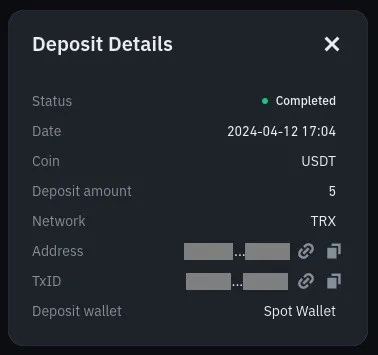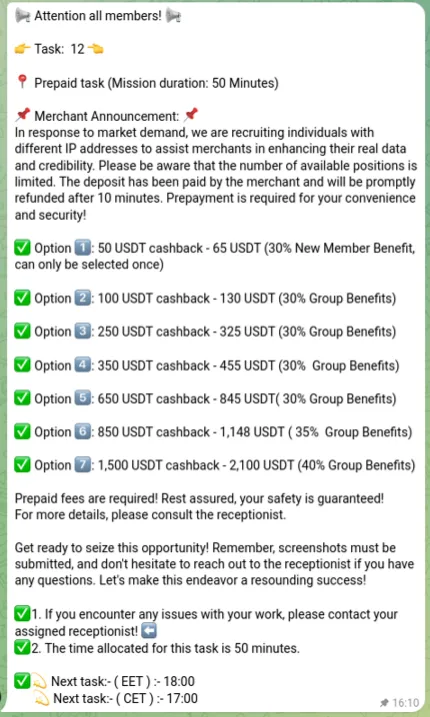Part-Time Job Scams: A Growing Threat


The promise of easy money can often be too tempting to ignore, especially when it arrives via popular messaging platforms like WhatsApp and Telegram. Yet, lurking behind these seemingly benign job offers is a new, insidious form of scam that leverages social engineering to exploit the unwary. Victims are contacted under the premise of a part-time job offer with easy tasks that promises a steady income or a large payout. Once enrolled, the victims are put through a convincing social engineering scheme that in some cases pays victims with the intent of stealing large sums of money from them later.
Victims, often in dire need of income, find these offers through unsolicited messages—red flags that are frequently ignored due to the pressing need for financial opportunities.

Understanding the Scam Dynamics
Scammers are likely to message hundreds of thousands of people with a similar message. These can target job seekers or victims in need of money who may be more prone to falling for the scam. Once initial contact is established, the scammers will lure their victims with a job offer, which usually entails some form of product boosting on popular platforms such as eBay, Instagram, Youtube and others. This lends legitimacy to the fake job as the tasks are often conducted on the real platform.
The mechanism of this scam is straightforward yet cunningly crafted. It begins with a flood of messages to potential victims, all promising easy earnings for simple tasks. These tasks vary widely but are common enough to not arouse suspicion, including:
- Adding products to shopping carts on sites like eBay and Amazon.
- Following and interacting with accounts on Instagram or TikTok.
- Watching and liking YouTube videos.
- Writing reviews for hotels, restaurants, or entertainment on platforms like Google or Yelp.
- Participating in online surveys or playing internet-based games.
New Tactic: The Phone Call Approach
A new way scammers initiate the process has recently emerged. Instead of blindly spamming via messaging platforms—which, while still useful, are increasingly recognized as fraudulent—scammers now use actual phone calls. These calls feature a natural feminine voice, most likely generated by AI, that tells the potential victim they have been selected to receive a $5 voucher as a user of TikTok. To claim it, the victim is instructed to add the calling number to their contacts and reach out via WhatsApp. Here’s a real example of the subsequent conversation:
Scammer: Hello, my name is XXXXXX. Can I talk to you for 2-3 minutes?
Victim: Yes, of course.
Scammer: Thank you for your response. Our company works with TikTok merchants who are willing to pay to increase subscriptions and the visibility of bloggers. Therefore, our company needs to hire many coworkers to increase subscriptions for them on the TikTok app, and they will pay you.
Scammer: We need many people to participate in the short video promotion bonus event and like TikTok content. Each video can earn you a reward of 3 euros, and you can earn a reward of 300-800 euros every day.
Scammer: Are you interested in working with us?
Victim: Yes, of course.
Scammer: How old are you? Do you have a Telegram application?
Victim: I am 28 years old and yes, I have Telegram.
Scammer: Okay, very well. This is the easiest part-time job, just go to the link (TikTok), like the video, take a photo and send it to us.
[Victim does the task and shows the screenshot]
Scammer: Well done, I think you already know how we work. I will give you 3 TikTok video links as a test. You don’t need to watch the entire video, just like it and send me a screenshot, and you will earn 3€.
Scammer: 3 TikTok Links
Scammer: Copy the links to TikTok or click on the linked website to open it, like it and send me a screenshot.
[Victim does the tasks and shows the screenshots]
Scammer: Okay, I think you know how we work. Please add our business manager on Telegram:
https://t.me/scammer_handle (link to scammer’s Telegram chat)
Your employment code: XXXXXXX
Scammer: Contact the recipient now, send him the code to fill out your details and you can earn 5€ for a total of 8€. Many people are in line to participate, please wait patiently, the receptionist will receive you. Please complete your information and submit it, after which you will receive a payment.
The Turn to Advanced Fee Fraud
After establishing trust, the scam takes a more sinister turn. Victims are invited to partake in 'VIP' tasks with the allure of higher earnings, which require an upfront investment with the promise of a significant return. Here, the psychology of commitment and consistency plays into the scammers' hands, trapping victims in a cycle of investment and expected returns.
These VIP tasks are typically promoted in group chats, adding another layer of perceived authenticity through community involvement. Unfortunately, these groups often contain fake or bot accounts, all orchestrated to showcase a thriving, lucrative operation. When a victim pays the advanced fee, they might receive further small 'returns,' but as soon as they make a substantial deposit, the scammers typically vanish, leaving the victim with significant financial losses.
Going undercover into the scammer trap
We recently followed through on one such task scam, in this case the task consisted of adding products to our eBay shopping cart and sending screenshots to the scammers. There would be a list of tasks, each with their own urgency and potential rewards, generally in the $5-10 per task completed.

After completing a few tasks, the scammers will then deposit a small amount of USDT cryptocurrency into our wallet, as we could verify in our own account:

As we can see, the scammers may deposit real crypto currency into the victim’s wallet once they complete some of the easy starting tasks, with the intent of building trust and adding legitimacy to the scam. This may occur multiple times and the victim can withdraw the deposited money to their own bank account. This is all in build up to the main part of the scam, where the scam actors provide a ‘VIP’ or main task, urging the victim to pay an advance fee with a guaranteed return, usually in the 30-50% range.
We were added to a larger group chat that featured the ‘VIP’ task, with numerous other users requesting the listed tasks and submitting proof of receiving commission transactions from the scammers. It is reasonable to assume that most of the accounts in the group are fake accounts or even bot accounts that are there to provide a sense of legitimacy, making the victim more likely to follow through on the advance fee scam.

As can be seen in the example above, there is a large variety in the amount that the victim may deposit. It is possible in the case of lower tiers of tasks that the scammers may again follow through and return the ‘invested’ money to the victim and add the commission, again, with the intent of building further trust. Once the victim selects a higher value option and deposits the money, the scammers will have achieved their goal and the victim’s money is already lost. The victim is highly invested into the scam, having sent, in some cases, thousands of dollars to the scammers. At this point, the bad actors will break contact or may make up reasons for why they cannot send the money and commission back, citing transaction fees, taxes or other made-up reasons. The intent here is to extract further money from the victim, usually with the added threat of losing the money if the victim does not follow through.
A typical advance fee scam in essence, what is unique about this variety of scam is that often the scammers send real money to their victims to build trust. Unfortunately, it is highly likely that the money sent to victims is the already stolen money from previous victims, essentially creating a self-feeding scam cycle.
The Impact and Scope
According to recent data from the Federal Trade Commission (FTC), investment-related scams have seen a dramatic increase, with a reported 14% rise in losses amounting to over $10 billion in the U.S. alone in 2023 [FTC]. The personal stories shared on forums such as Reddit illustrate the devastating impact of these scams. Victims describe how they were duped into losing thousands of dollars after being lured by the promise of easy money for simple online tasks [Reddit Scam Example].
Global warnings have been issued, such as those by Singapore Police, highlighting the rise of job scams involving tasks on social media platforms [Singapore Police Advisory]. We have detected this type of scams in several countries and languages, including Spanish, Czech and, of course, English. The good quality of the language used in those conversations makes us think they are using some AI-powered bot.
Protection and Prevention Tips
Below we provide a short summary of how to best identify and protect yourself from a task/job scam:
- Recognize the Red Flags: Unsolicited messages promising easy money should immediately raise suspicions. Legitimate job offers typically come through official channels and do not promise large sums for trivial tasks.
- Verify Before You Trust: Take the time to research the company or offer. A legitimate business will have a digital footprint that extends beyond a single platform or message chain.
- Understand the Role of Cryptocurrency: Cryptocurrencies, due to their irreversible transactions and anonymity, are favorites among scammers. Be extremely cautious when an offer involves cryptocurrency transactions.
- Never Pay to Earn: Any job that requires you to pay upfront in order to start earning is almost certainly a scam. Real job offers do not require employees to give money to the company.
- Use Available Resources: If you suspect you've encountered or fallen victim to a scam, report it to local authorities, the FTC, or cybersecurity firms like Avast that can offer support and resources.